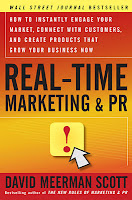 Long overdue on my reading list has been David Meerman Scott’s bestseller, “Real-Time Marketing & PR.” Now that I’ve read it, I don’t know how I could have gone without it. “Real-Time” is a catalyst of insightful case studies, resources and thought-provoking strategies.
Long overdue on my reading list has been David Meerman Scott’s bestseller, “Real-Time Marketing & PR.” Now that I’ve read it, I don’t know how I could have gone without it. “Real-Time” is a catalyst of insightful case studies, resources and thought-provoking strategies.His book adds new insight to already classic examples of real-time PR such as the “United Breaks Guitars” incident and highlights other great marketing examples including the Grateful Dead’s real-time tour marketing strategy. Scott also touches on the importance of crowdsourcing. One of my favorite analogies from the book was his astute observation of today’s two-way, tech-savvy communications between vendors and consumers as resembling that of an ancient bazaar – something that was lost in the later part of the 20th century due to the one-way communication format of traditional media.
I particularly enjoyed Scott’s citation of Telstra’s 3Rs of Social Media Engagement:
- Representation
- Responsibility
- Respect
If you’re puzzled about where to start writing your organization or brand’s social media guidelines, the book includes eight insightful steps to create and implement those guidelines along with a great example that showcases how IBM gets it.
Scott is also very candid about his own missed opportunities and how real-time responses by others such as GM helped to provide positive examples of the organizations and brands that readily understand the urgency to adapt a real-time strategy.
Whether your strategies involve everyday or crisis management communications, “Real-Time” resonates a central theme for succeeding in today’s evolving marketing and PR field: “Scale and media buying power are no longer a decisive advantage. What counts today is speed and agility.”



